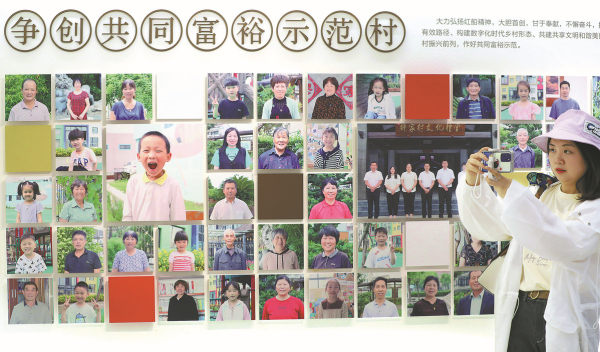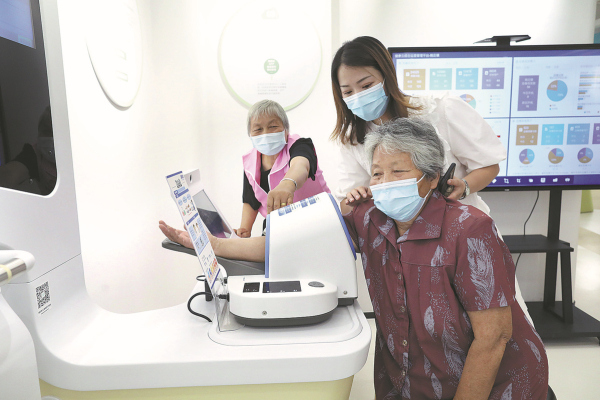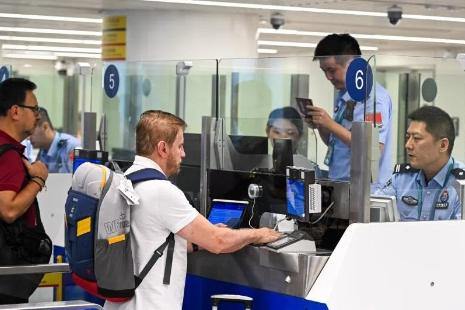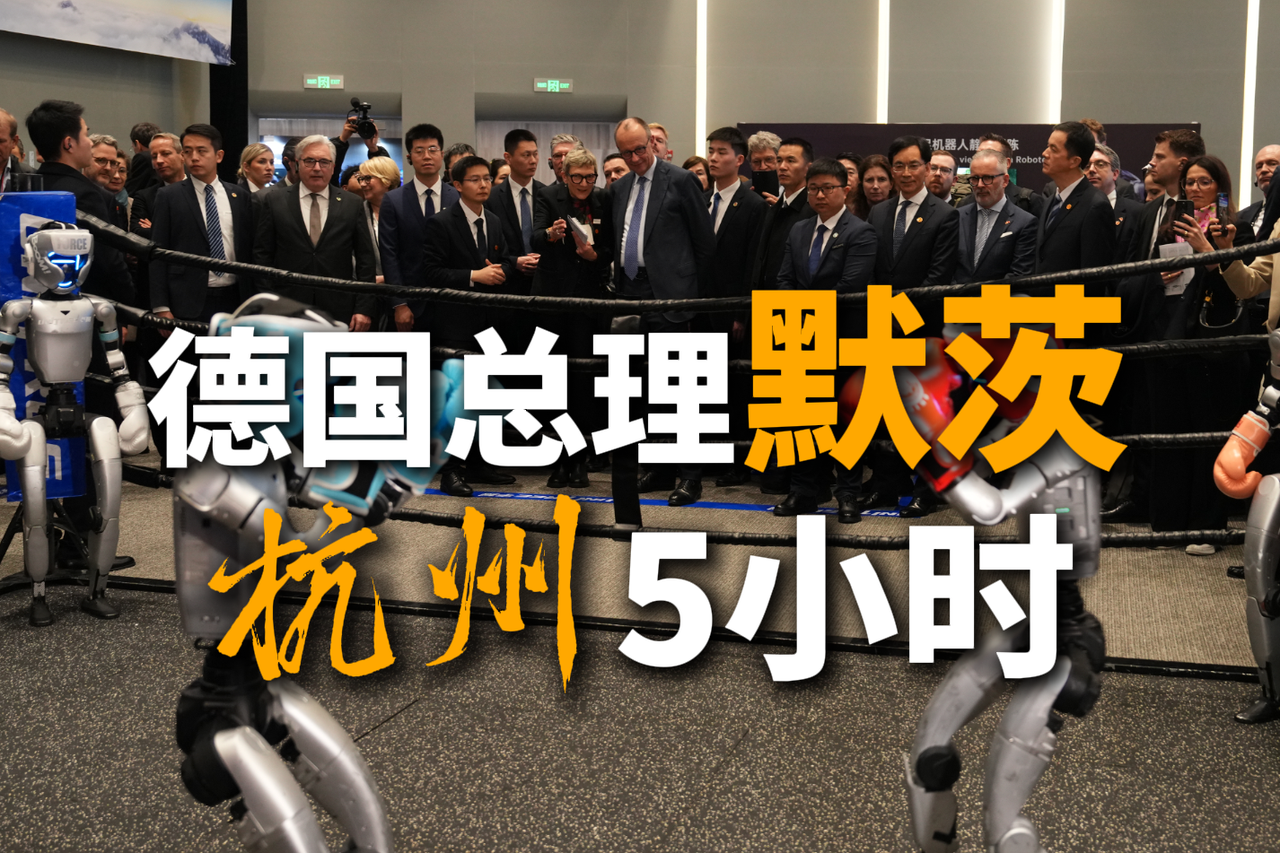
A visitor tours an exhibition in Miaojia village, Jiashan county, Jiaxing, Zhejiang province, which showcases residents' efforts to realize common prosperity. [Photo by Zhu Xingxin/China Daily]
Wealth gap targeted between urban and rural areas
Every day at 4 pm, a spacious village workshop in Zhejiang province becomes a hive of activity as residents age 65 and older weigh the broccoli they have picked.
Their work in Wubu village in the city of Taizhou is by no means strenuous, and an experienced person can earn up to 100 yuan ($15.50) a day.
The employment was introduced in 2017 by Taizhou Chenqi Catering Management, which teamed up with the local government to provide job opportunities for seniors in the village.
Previously, villagers lived on a basic monthly allowance of about 1,000 yuan provided by the local government, or they left the area to make a living.
Hong Ming, general manager of Taizhou Chenqi Catering, said the chopped broccoli stalks are assessed for quality before being processed into pickles and sold to neighboring areas such as Shanghai and Jiangsu province.
This business model in Wubu has been adopted in many other villages in Taizhou, he said, with the aim of providing employment for seniors in rural areas and improving their living conditions.
Hu Ou, Party chief of Ningxi county, which oversees Wubu, said that working with such companies, along with the introduction of similar projects in villages, enables residents to stay in their home areas and acquire working skills.
"Based on our experience, government policies can be adopted more efficiently when villagers' lives are significantly improved. In other words, villagers have increasing faith in the local government," she said.
The progress made in Wubu is just one example of steps taken by the authorities in Zhejiang to realize common prosperity.
On Feb 25, President Xi Jinping, addressing a gathering to mark the nation's achievements in eradicating poverty and to commend outstanding efforts by individuals, said China upholds a people-centered development philosophy. It unswervingly pursues prosperity for all, with the emphasis on ending poverty, improving people's well-being and realizing common prosperity being the essential requirements of socialism.
Xi, also general secretary of the Communist Party of China Central Committee, stressed at the gathering the importance of integrating the consolidation of poverty alleviation achievements and rural vitalization.
On June 10, a decision to establish Zhejiang as a demonstration zone for common prosperity was announced in a guideline jointly released by the CPC Central Committee and the State Council, China's Cabinet.
The decision came as the nation works toward the goal of tackling development problems and narrowing the wealth gap between urban and rural areas after eradicating extreme poverty last year.

Mo Xuefeng (right), general manager of Zhejiang Jiashan Chocolate Sweet Town, demonstrates a chocolate waterfall to visitors. [Photo by Zhu Xingxin/China Daily]
Income target
A plan was released on July 19 by the Zhejiang authorities, aimed at building the province into a pilot zone to achieve common prosperity through high-quality development by 2025.
The plan states that an "olive-shaped social structure" should be formed in Zhejiang to make middle-income households the mainstay of the economy. The province should strive to become an example of how to mitigate disparities between regions, urban and rural areas, and incomes.
Annual per capita disposable income in Zhejiang should reach 75,000 yuan by 2025, while income disparity between urban and rural residents should be less than 1.9 times, according to the plan. The province's urbanization rate should reach 75 percent by 2025, with the income gap between urban and rural residents kept at a reasonable level, the plan states.
According to Yuan Jiajun, Zhejiang's Party secretary, common prosperity can be achieved through a further optimized social structure and a complete social system. High-quality integration between urban and rural areas through accelerated modernization of villages, deepened reform in rural areas and the advancement of agriculture can improve the quality of life in the countryside, he said.
"A new type of city-village relationship should be established. While complementing each other, urban and rural areas should seek concerted development and common prosperity," Yuan added.
Zheng Yongnian, a professor of politics at the Chinese University of Hong Kong (Shenzhen), said consolidating social bases is crucial to achieving common prosperity. To this end, a two-way flow between urban and rural areas should be established in China.
"The nation has already invested heavily to address issues concerning agriculture, villages and farmers, but we can still see a one-way outflow of resources and people from villages. It is our mission to guide more middle-income earners to villages in order to form a two-way flow of urban and rural residents," he said.
Such a flow can be seen in Tengtou village, Ningbo city, eastern Zhejiang, which as early as 2010 set a target to make rural life more attractive for urban residents. By introducing more than 60 companies to Tengtou, green industries such as eco-friendly agriculture, landscaping, new energy and new materials now comprise 80 percent of the local annual GDP.
Fu Pingjun, Party secretary of Tengtou, said: "A pleasant environment is crucial to prosperity in rural areas. In the 1960s, Tengtou started to improve soil quality, renovate villagers' homes and collectively manage farmland. We have successfully turned our village into a garden, which is also one of the major reasons that we were a showcase at the 2010 World Expo (in Shanghai)."
Fu said that as prosperity in just one area is far from sufficient, a rural vitalization institute was founded in Tengtou in 2019, which has passed on the village's successful experience to more than 15,000 industry leaders and civil servants from other rural areas.
Chuxin Farm in Hengkantou village, Yuyao city, eastern Zhejiang, is one example of successfully combining urban and rural life. With investment from agricultural leader New Hope Group, the farm officially opened on July 13, integrating agriculture, catering and retailing.
Tang Shimin, the farm's general manager, said the complex was built in a rural area to attract more young people born in villages to return home and revitalize these areas.
"Urban residents can place orders to customize the type of vegetables they wish to grow with our help on the 28,000 square meters of land occupied by the farm. As courier services are not accessible every day in Hengkantou, villagers can store their agricultural produce temporarily in our freezers and have it delivered later," Tang said.
Watermelons the farm produced with local agricultural experts earlier this year sold out within a week via pre-ordering, although they were priced 30 percent higher than other such melons on the market.
"By introducing private enterprise, villagers can discover the latest industry trends, search for talent, seek financial help and technology empowerment. Our successful experience in Hengkantou has enabled us to apply this business model in other places, such as Jiangsu and Fujian provinces," Tang said.

A resident of Yaozhuang town, Jiashan county, Zhejiang, has her blood pressure checked at the local health center. [Photo by Zhu Xingxin/China Daily]
'Future communities'
The concept of common prosperity, one of whose aims is to reduce the wealth gap between urban and suburban areas, has also given rise to the emergence of more smart and "future communities" in Zhejiang's metropolitan and other urban areas.
In Hangzhou, the provincial capital and hub of the nation's internet economy, Young City (Yangliujun community) in Pengbu, Shangcheng district, has established a "future community".
Such a community, which was mentioned in the provincial government's report in 2019, is based on the concept of an urban development project that aims to make cities more people-oriented, environmentally friendly and digital.
Zhejiang plans to build some 100 pilot communities this year and implement the project throughout the province by the end of next year.
Hui Haitao, Party secretary of Pengbu, said: "Yangliujun community is the province's first transit-oriented development project. The community has a population of about 11,000, of which the post-1980s generation accounts for 62 percent."
As most of the community's residents are young, more attention has been paid to digital governance, education for all ages, a harmonious relationship with neighbors, and improved living standards.
The community's smart health station has built a "cloud consulting clinic" with Sir Run Run Shaw Hospital affiliated with Zhejiang University School of Medicine in Hangzhou. The clinic enables remote electrocardiograph and ultrasound consultations through its 5G network. In addition, it provides international expert services for expatriates in the community.
Zhong Yinyan, director of the community health service center, said, "We introduced a new-version public health center, providing 24-hour self-service checkup services for community residents."
Doctors can establish health records for people online, setting up a loop for health management between residents and physicians, Zhong said.
To form a "mutual assistance" culture among neighbors, the community established a volunteer station, attracting stores in the area and local residents to provide 20 types of services.
One volunteer said, "The station provides residents with convenient services anytime, anywhere, including free appliance repairs, clothes-mending and haircutting. Community residents provide the services and receive the resources."
The community will also establish a "children's council" to encourage children to take part in public affairs decision-making, with the aim of enhancing their sense of ownership and social responsibility.
Hu Zhenhua, dean of the School of Business at Wenzhou University in Zhejiang, said that on the road to common prosperity it is vital to enhance residents' sense of achievement and happiness.
Jiang Lai contributed to this story.




